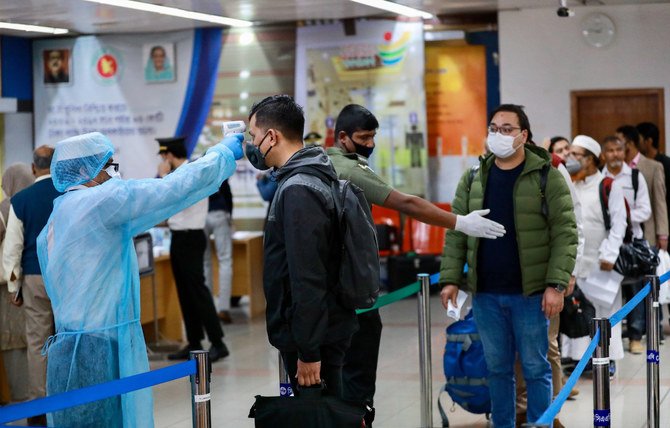DHAKA: Bangladesh on Saturday opened six COVID-19 testing facilities at its largest airport in the capital Dhaka to facilitate international travel, mainly for its UAE-bound migrant workers impacted by flight restrictions in the wake of the pandemic, a government official said.
The privately run PCR labs at the Hazrat Shahjalal International Airport are aimed at outbound travelers who require proof that they are virus-free on arrival at their destinations.
They are the first at an airport in Bangladesh, one of three international hubs in the country, with a capacity to carry out more than 5,000 tests a day.
“We have set up all necessary facilities and equipment. We will conduct a test-run tonight and hand over the facilities to the civil aviation authorities,” Dr. Shariar Sazzad, the health officer in charge at the airport, told Arab News.
The tests are not covered by insurance, with each international traveler required to pay for COVID-19 screening.
“Each of the tests will cost around $20 at all six facilities at the airport,” Sazzad said.
Instalment of the testing facilities comes after the UAE in August lifted flight curbs for travelers from a list of previously suspended countries, including Bangladesh, provided they were fully vaccinated with a jab approved by the World Health Organization and tested negative for COVID-19 six hours before departure.
Since then, thousands of Bangladeshi migrant workers had been rallying for authorities to install PCR labs at the airport. On Sept. 6, Prime Minister Sheikh Hasina directed authorities to establish PCR testing facilities at all three international airports in Dhaka, Chattogram and Sylhet.
With nearly 1,250 cases a day, Bangladesh has struggled to combat a surge in COVID-19 infections driven by the highly contagious Delta variant. As of this week, only 9.3 percent of its population of 170 million people had received both doses of the COVID-19 jabs.
The South Asian nation’s economy has taken a beating from a lack of foreign remittances after thousands of migrant workers were unable to return to work due to travel curbs imposed by host nations.
The UAE is the second-largest destination for Bangladeshi migrant workers in the Gulf and the Middle East, with more than 1 million employed in the country.
However, tens of thousands of workers were impacted by flight curbs imposed by the Gulf state, with several left stranded in Bangladesh after returning home for a break.
Mohammad Abul Bashar, a 38-year-old construction worker in Dubai, is one example. He traveled to Bangladesh six months ago and is “desperately waiting” to return to the UAE.
“I was supposed to resume duty in the first week of September but couldn’t take the flight since there were no COVID-19 testing facilities at the airport,” he told Arab News.
“Now I am waiting to renew my visa and hope to travel within the next two weeks,” Bashar said, adding he was “so relieved” that PCR labs had finally been launched at the airport.
Salahuddin Chowdhury, another migrant worker, said that the delay in setting up the PCR labs had “caused huge losses for many.”
“I have been working as a salesperson at a shop in the UAE for six years and was supposed to return by mid-August. The delay has cost me around $300, which is a month’s salary,” Chowdhury, 27, told Arab News.
“I’m hoping to fly by the end of this week,” he added.
While workforce recruiting agencies welcomed the move to set up PCR labs at Dhaka airport, they urged authorities to launch more flights “to help as many workers as possible.”
“Every day, around 1,000-1,500 migrant workers would travel to the UAE (before the outbreak). Since more than 35,000 workers are now waiting to return to their workplaces, I think aviation authorities should introduce extra flights from Dhaka for the next few weeks,” Tipu Sultan, president of the Recruiting Agencies Unity Forum, told Arab News.
He also urged authorities to shoulder the costs of the tests.
“A majority of these migrant workers are extremely poor and spend a lot of money to secure a job in the overseas market, incurring huge debts for the visa and tickets. The $20 COVID-19 tests will be an extra burden on them,” he said.
Instead, Sultan suggests that the government either subsidise the cost or pay for it through “the expatriates’ welfare fund, which is also funded by the migrant workers.”
Shariful Hasan, migration program head for BRAC, a Bangladeshi-origin international NGO, agrees and said it was imperative for government ministries to make a “coordinated effort” and ease travel for migrant workers.
“Our migrant workers are desperate to return to work at any cost. Authorities should remain vigilant and ensure the smooth functioning of PCR labs installed at the airport,” Hasan told Arab News.
“These facilities will serve the migrant workers a lot, especially if other host countries also introduce the same travel rule

